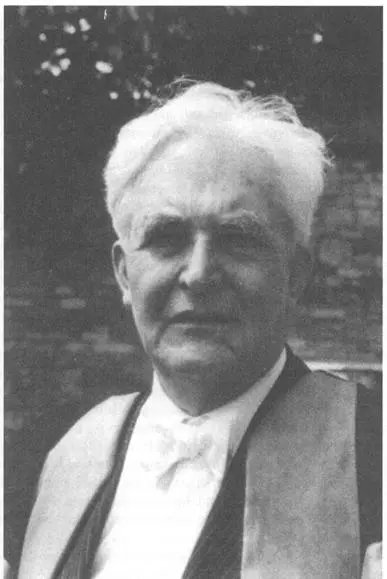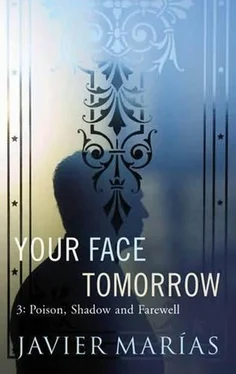Peter died six months after my father, although he was about eight months older than him. Mrs. Berry phoned me in Madrid; she was very succinct, belonging, as she did, to the thrifty generation and doubtless mindful that she was phoning abroad. Or perhaps that was just her style, one of extreme discretion. 'Sir Peter passed away last night, Jack,' she said, employing the usual euphemism. That was all, or, rather, she added: 'I just wanted you to know. I didn't think it fair that you should carry on believing he's still alive when he's not.' And when I tried to find out what had happened and the cause, she merely said: 'Oh, it wasn't unexpected. I had been expecting it for weeks,' and informing me that she would write to me later on. I couldn't even ask her to whom it would have been 'unfair,' to Peter or to me. (But presumably to both of us.) A few days later, I recalled that in England, in comparison with Spain, they take a long time to bury their dead and that I might still be in time to travel to Oxford and attend the funeral. So I phoned her several times and at different hours of the day, but no one answered. Perhaps Mrs. Berry had gone to stay with a relative, had left the house as soon as her employer died, and I realized that there was almost no one I could ask now to find out more information. There was Tupra, but I didn't turn to him: it was hardly a moment of difficulty, confusion, trouble or danger, and he hadn't himself deigned to inform me of Peter's death. I was assailed by the feeling-or perhaps it was a superstition-that I didn't want to waste a cartridge unnecessarily, as if with him I only had a certain number that would last as long as our respective lives. Young Pérez Nuix didn't bother to tell me either: she may not have known Peter personally, but she would have heard. I could have phoned one of my former colleagues, Kavanagh or Dewar or Lord Rymer the Flask or even Clare Bayes-the very idea!-but I had long ago lost touch with them. I could have tried The Queen's or Exeter, the colleges with which Peter had been connected, but their bureacracy would almost certainly have passed me fruitlessly from office to office. And the truth is I couldn't be bothered; memory and grief don't always chime with social duty. I was very busy in Madrid. I would have had to dust off my cap and gown. So I just let it go.
Mrs. Berry's promised letter took more than two months to arrive. She apologized for the delay, but she'd had to take care of almost everything, even the recent memorial service, a ceremony which, in England, tends to take place sometime after the death. She was kind enough to send me a copy of the order of service, listing the hymns and readings. Wheeler hadn't been a religious man, she explained, but she had preferred to fall back on the rites of the Anglican church, because 'he always hated the improvised ceremonies people hold these days, the secular parodies that are so popular now' The service had taken place in the University Church of St. Mary the Virgin in Oxford, a church I remembered well; it was where Cardinal Newman had preached before his conversion. Bach had been played and Gilles, as well as Michel Corrette's gentle, ironic Carillon des morts; hymns had been sung; passages from Ecclesiasticus had been read ('… He will keep the sayings of the renowned men: and where subtil parables are, he will be there also. He will seek out the secrets of grave sentences… he will travel through strange countries; for he hath tried the good and the evil among men. Many shall commend his understanding; and so long as the world endureth, it shall not be blotted out; his memorial shall not depart away, and his name shall live from generation to generation. If he die, he shall leave a greater name than a thousand: and if he live, he shall increase it'), as well as the Prologue from La Celestina in James Mabbe's 1605 translation and an extract from a book by a contemporary novelist of whom he was particularly fond; and his praises had been sung by some of his former university colleagues, among them Dewar the Inquisitor or the Hammer or the Butcher, whose eulogy had been particularly acute and moving. And this had all been arranged according to the very precise written instructions left by Wheeler himself.
Mrs. Berry also enclosed a color photo of Peter taken some years before ('I thought you would like it as a keepsake,' she said). Now I have it framed in my study and I often look at it, so that the passing of time does not cause my memory of his face to grow dim and so that others might still see it. There he is, wearing the gown of a Doctor of Letters. 'It's made from

scarlet cloth with grey silk edging or facing, and the same on the sleeves,' Mrs. Berry explained. 'Sir Peter's gown had belonged to Dr. Dacre Balsdon, and the grey had faded somewhat, so that it looked more like a dirty blue or a greyish pink: it had probably been left out in the rain. I took the photo in Radcliffe Square on the day he received that degree. It's a shame he took off his mortarboard to pose for the picture.' There is, of course, no word in Spanish for the untranslatable 'mortarboard.' Underneath his gown Peter is wearing a dark suit and a white bow tie, an outfit which is referred to as 'subfusc' and is compulsory at certain ceremonies. And there he is now in my study, fixed forever on that far-off day, in a photo taken when I did not yet know him. The truth is that he changed very little from then until the end. I can recognize him perfectly when he looks at me with those slightly narrowed eyes, and you can clearly see the scar on the left-hand side of his chin. I never did ask how he got it. I remember that I hesitated over whether to ask him on that last Sunday, after lunch, when I was about to go to the station and get the train back to London and he accompanied me to the front door, leaning more heavily than ever on his stick. I noticed then that his legs were weaker than they had been on any other occasion, but they were doubtless capable of carrying him about the house and the garden and even up to his bedroom on the second floor. But he looked very tired, I thought, and I didn't want to make him talk much more, and so I chose to ask him something else, just one more thing before we said goodbye:
'Why did you tell me all this today, Peter? Believe me, I found it fascinating, and I'd love to know more, but I find it odd that, after years of knowing each other, you should tell me about all these things you've never said a word about before. And once you said to me: "One should never tell anyone anything," do you remember?'
Wheeler smiled at me with a mixture of slight, almost imperceptible melancholy and mischief. He placed both hands on his walking stick and said:
'It's true, Jacobo, you should never tell anyone anything…until you yourself are the past, until you reach the end. My end is fast approaching and already knocking insistently at the door. You need to begin to come to terms with weakness because there will come a day when it will catch up with you. And when that moment arrives, you have to decide whether something should be erased forever, as if it had never happened and never even had a place in the world, or whether you're going to give it a chance to…' He hesitated for a moment, looking for the right word and, not finding it, he made do with an approximation: '… to float. To allow someone else to investigate or recount or tell it. So that it won't necessarily be lost entirely. I'm not asking you to do anything, I assure you, to tell or not to tell. I'm not even sure I've done the right thing, that I've done what I wanted. At this late stage, I don't know what my desires are any more, or if I have any. It's odd, towards the end, one's will seems to become inhibited, to withdraw. As soon as you go through that door and walk away, I shall probably regret having told you. But I can be sure that Mrs. Berry, who knows most of what happened, will never say a word to anyone when I'm gone. With you I'm not so sure, though, and so I leave that up to you. I might prefer it if you kept silent, but, at the same time, it consoles me to think that with you my story might even…' He again sought some better word, but again could not find it: '… yes, that it might still float. And that's really all it comes down to, Jacobo, to floating.'
Читать дальше













